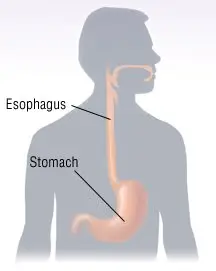
Date of last review: August 31, 2020
What is Stomach Cancer?
Stomach cancer, also called gastric cancer, is the uncontrolled growth of abnormal cells that form the inner lining of the stomach. The disease often does not cause symptoms until its later stages. Usually, by the time stomach cancer is diagnosed, the prognosis is poor. Most people who are diagnosed with stomach cancer are over age 60. The disease rarely occurs before age 50. This type of cancer is particularly common in Japan.
|
|
Several factors increase the risk of stomach cancer:
- a diet high in smoked, salted, or pickled foods
- alcohol and tobacco use
- a history of persistent stomach irritation or ulcers
- previous stomach surgery
- multiple family members that have had stomach cancer.
Eating plenty of fruits and vegetables may reduce the risk of stomach cancer.
Symptoms
Many people with stomach cancer do not have any symptoms. When symptoms occur, they can be so vague that people ignore them. The symptoms of stomach cancer are also common symptoms of other gastrointestinal problems, such as stomach ulcers and viruses.
The most common symptoms of stomach cancer include
- bloating after meals
- nausea
- loss of appetite
- recurrent indigestion or heartburn
- diarrhea or constipation.
Other symptoms include
- sudden weight loss
- vomit blood (red or coffee-ground appearance)
- black, tarry stools (from blood digested in the stomach).
Diagnosis
If your doctor suspects stomach cancer, he or she may do a fecal occult blood test. This test checks the stool for tiny amounts of blood in stool that can't easily be seen. However, some people with stomach cancer don't have blood in their stool.
Next, your doctor will likely recommend an upper endoscopy and imaging study, such as an abdominal CT scan.
During endoscopy, you are sedated while your doctor threads a lighted tube called an endoscope down your throat and into your stomach. With this tool, your doctor can see the inside of your stomach and spot any abnormalities. It usually doesn't hurt because your doctor will numb the back of your throat before the tube is passed through.
|
|
Your doctor will do a biopsy of any area that appears abnormal. This involves removing small bits of stomach tissue that will be examined in a laboratory. The tube leading to the stomach, called the esophagus, may also be biopsied. Some stomach cancers can extend up into the esophagus.
Expected Duration
Stomach cancer will continue to worsen unless it is treated. Doctors believe that most stomach cancers develop slowly. Years may pass before it causes symptoms.
Prevention
Experts don't completely understand what causes stomach cancer. However, some evidence indicates that you can help prevent the disease with a healthy diet and lifestyle:
- Eat plenty of fresh fruits and vegetables.
- Do not smoke.
- Drink alcohol in moderation. Women should have no more than one drink a day, and men no more than two.
- Avoid eating smoked, cured, fermented, and pickled foods, as well as foods that have been cured with nitrates, such as bacon.
Cancers located at the junction between the esophagus (the swallowing tube) and the junction of the stomach can be caused by excessive regurgitation of stomach acid into this area. These types of cancers are becoming more common. Controlling acid reflux may help prevent these cancers.
Treatment
Surgery, chemotherapy, and immunotherapy are the most common treatments for stomach cancer. Currently, surgery offers the only cure for the disease. During surgery, your doctor will remove all or part of the stomach. Nearby lymph nodes may also have to be removed. Choose an experienced surgeon to operate, because removing the lymph nodes requires special skills. Because the cancer is so common in Japan, surgeons in Japan are often the first to develop new techniques that help improve outcome.
If the cancer has spread to areas around the stomach or into the lymph nodes, chemotherapy and immunotherapy won't cure the cancer. But they can relieve symptoms and slow the progress of the disease. They may prolong survival, too. Chemotherapy with or without immunotherapy involves taking anticancer drugs, either by mouth or through injections into a vein.
You may receive additional treatment to ease side effects of your cancer therapy. Common side effects include
- fatigue
- nausea
- a drop in certain types of blood cells
- hair loss.
New drugs have been discovered that target specific genetic abnormalities of the stomach cancer cells.
During treatment, your doctor will want you to continue eating healthy meals to maintain your strength. You many need to take certain vitamins, especially if a large portion of the stomach has been removed.
Treatment options
The following list of medications are in some way related to or used in the treatment of this condition.
- Xeloda
- fluorouracil
- Opdivo
- Enhertu
- Mutamycin
View more treatment options
When To Call a Professional
You should see your doctor if you have symptoms of stomach cancer, such as heartburn, that persist or don't respond to over-the-counter antacids. Some people should be particularly alert for symptoms of stomach cancer, including those who:
- use tobacco or alcohol
- have a family history of stomach cancer
- have a diet low in fruits and vegetables
- eat lots of cured, smoked, or salted meats.
Prognosis
Prognosis depends on how advanced the cancer is when it is diagnosed. When the disease is found early, before the cancer cells that started in the lining grow into the lower stomach layers or spread outside the stomach, the chance of recovery is much greater. But no two cancer patients are alike, and responses to treatment vary from person to person.
Additional Information
American Cancer Society (ACS)
https://www.cancer.org/
National Cancer Institute (NCI)
https://www.cancer.gov/
American College of Gastroenterology (ACG)
https://www.gi.org/
American Gastroenterological Association
https://www.gastro.org/






